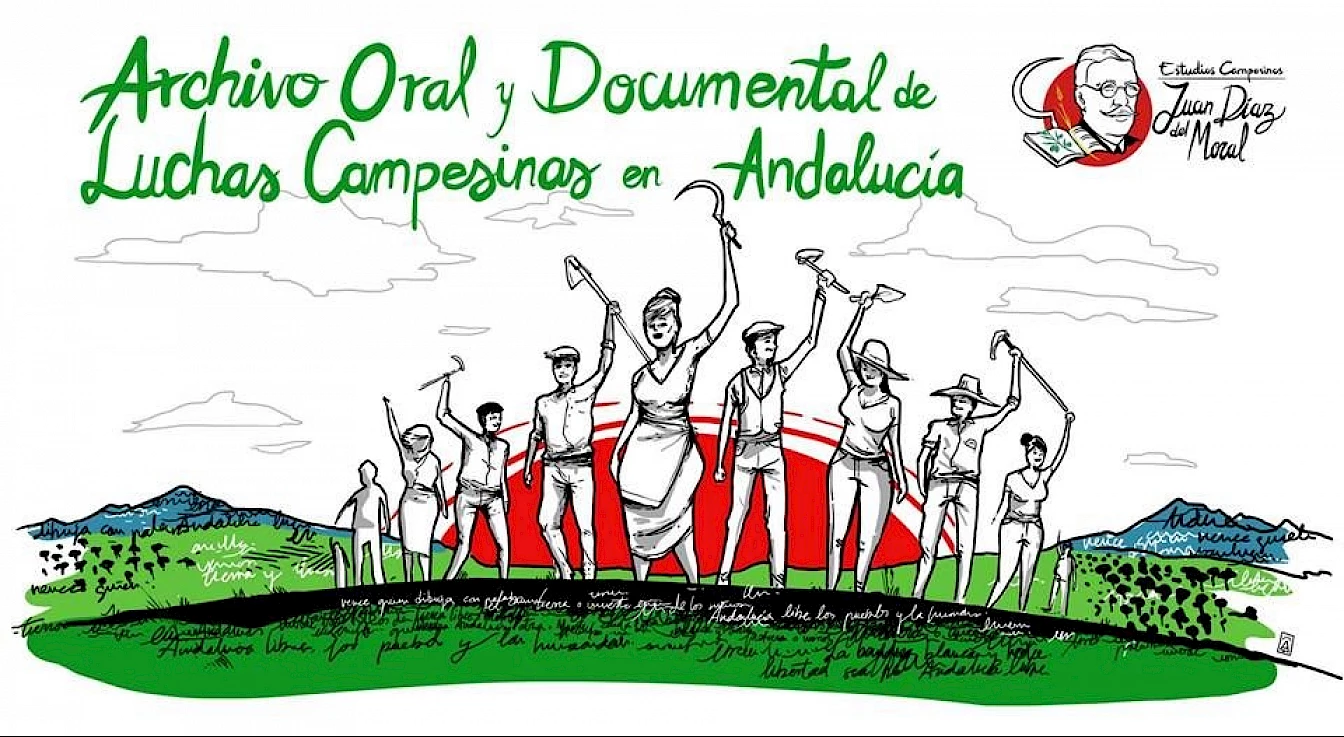
Archivo de estudios campesinos (Rural Studies Archive). Photo: Abel Fernández López. Courtesy: Rural Studies Archive.
The Archives of the Commons seminar was held on 11 and 12 December 2015 at the Museo Nacional Centro de Arte Reina Sofía in Madrid. It was conceptually developed through the joint work and dialogue of three institutions/ platforms: the Museo Reina Sofía, Fundación de los Comunes (Commons Foundation), and Red Conceptualismos del Sur (Southern Conceptualisms Network). The collaborative nature of the project was, in fact, the seminar's first distinctive feature: the conviction that these three agents, with their different histories, interests, and agendas, would be able to produce and share a space for dialogue and interaction on equal terms.
The objectives were: (1) to think about the meaning of the archive, in today's context of highly volatile information, memory and social communication, as a vessel for collective memory, particularly in terms of the knowledge and practices of dominated classes and subaltern groups; (2) to reflect on how archives of the commons, which sustain an important heritage based on collective memory, identity, and experiences, can be created, managed, conserved and opened up to citizens and the general public as an exercise in civic and democratic culture, irrespective of nationality or of the availability of financial means to consult, use, and enjoy said archives, and (3) to discuss the possible role of public institutions in protecting these types of archives from the double threat of privatisation on one hand (for example, Latin American collections of political art that are the result of the work of individual artists and collectives), and of neglect and invisibility on the other (for example, the collective memory of struggles and major social events that are part of the experience of the present, but have been sidelined by the media, academic, and institutional establishments' modes of production of discourse and memory).
The second distinctive feature of the seminar had to do with the archives and repositories that were invited to participate, and with the working dynamic that was adopted. The conditions of emergence of each project, and their links to the socio-historic contexts in which they originated were taken into account. Almost all the selected participating projects were created in response to historically-rooted needs and issues that their founders felt committed to. The participating archives were:1 Archivo Contra la Pared, Archivo de Estudios Campesinos, Archivo de la autonomía juvenil de Madrid, Archivo del Duelo, Archivo Digital de la Autonomía Obrera, Archivos en uso, Desmemoriados, El Recetario, Feminicidio.Net, Human Costs for Border Control, PAD.MA, and Women in Black.
The seminar was structured around two types of working sessions. The first was a public event with lectures by Nancy Kranich, Ariella Azoulay, Jorge Reina Schement and William Gambetta. In the second session, the speakers and representatives of the archives worked together for a full day on three core areas: the politics of archives and forms of institution, archive economies, and techno-political devices.
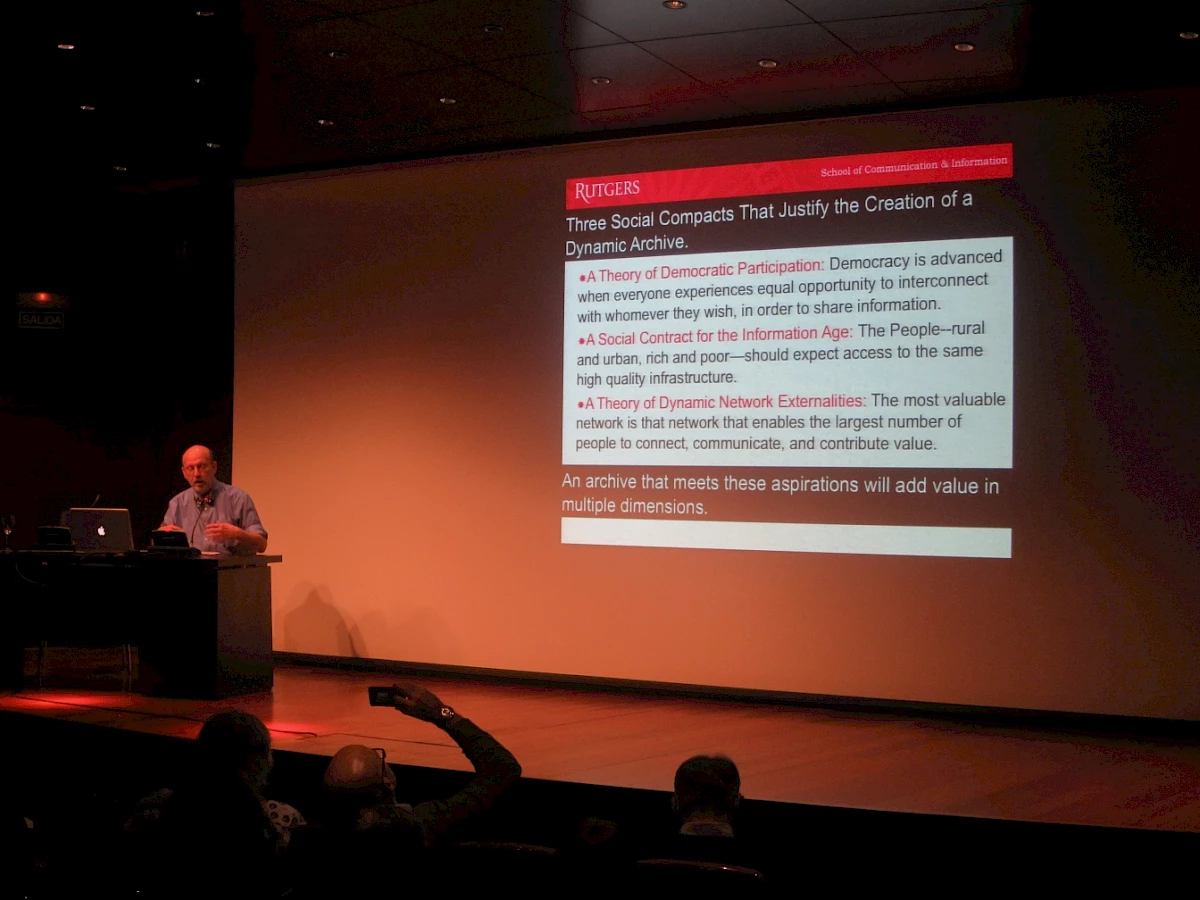
Conference by Jorge Reina Schement: 'Meeting the Challenge of Meaningful Access: Connectivity, Capability, Content, and Context', Museo Reina Sofía, 11 December 2015. Courtesy of Red Conceptualismos del Sur.
THE POLITICS OF ARCHIVES AND FORMS OF INSTITUTION
The following statements by Georges Perec in "Think/Classify" (1974/1997) encapsulate the two core tensions that shape the boundaries of the archive: "Behind every utopia there is always some great taxonomic design: a place for everything and every thing in its place." "My problem with sorting orders is that they do not last; I have scarcely finished filing things before the filing system is obsolete."
On one hand, there is a utopian yearning for classification to burst the boundaries of the archive and embrace the whole of reality, given that to classify means to understand, or at least to "comprehend". On the other, there is the impossibility of reducing reality to an orderly series of elements.
In institutional archives, these tensions are compounded by the complexities bound up with processes of legitimation, inclusion, exclusion, and the construction of the canon, which are inherent to and inevitable in "institutional" activities. To overcome these tensions, or at least reduce or counteract their impact, the museum probably needs to create larger relational networks outside the institution, as well as increasing its flexibility, and publicly acknowledging its own weaknesses.
From this point of view, the relationship between institutional and non-institutional archives is complex – as is the relationship between the institution and anything that is not within its bounds – but all the processes and prospects that seek to increase its permeability and its openness to the outside world are beneficial.
Some initial questions arise at this point: How can we define the relationships between institutional and non-institutional archives? What are the main differences between them? How can institutional archives open up to the outside world? What expectations does an institutional archive raise, and how can it meet them?
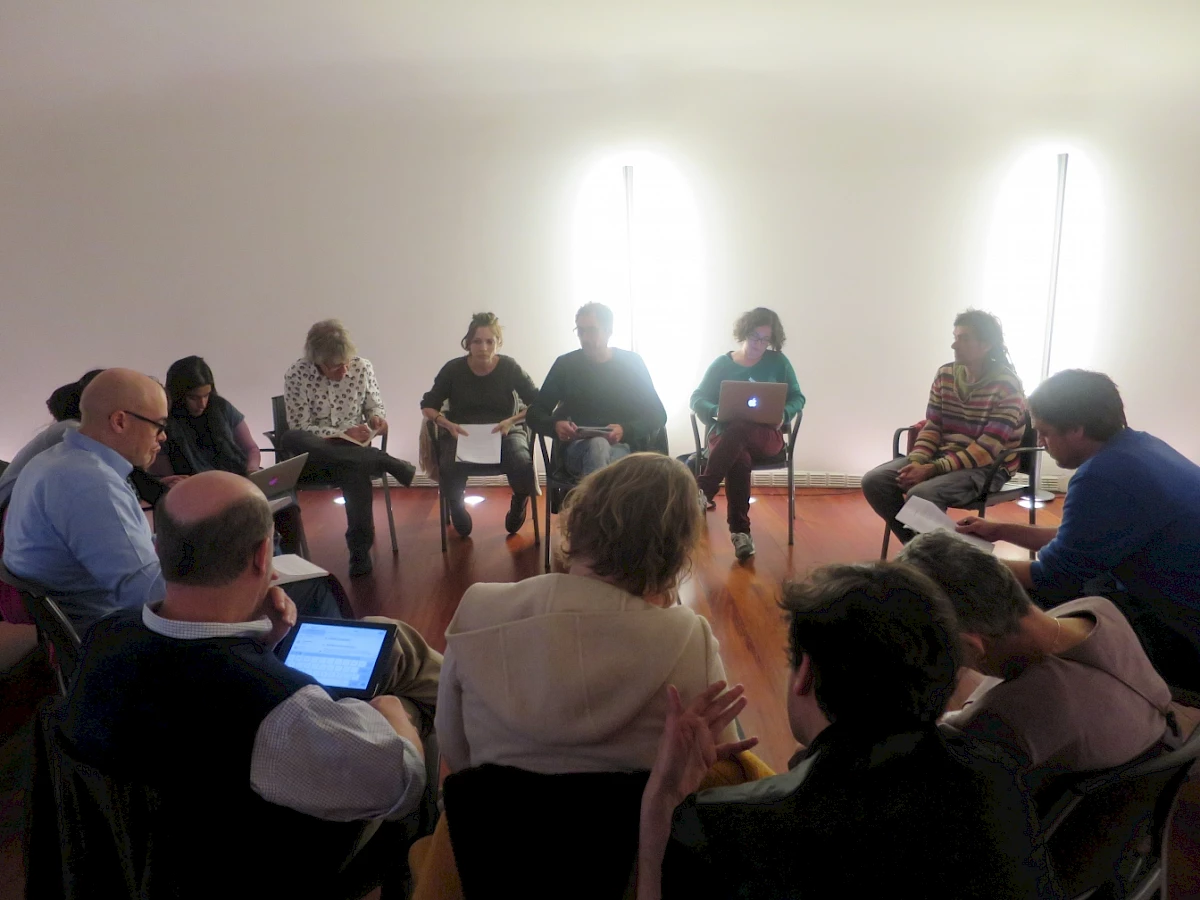
Workshop: 'Archive Economies', Museo Reina Sofía, 12 December 2015. Photo: Red Conceptualismos del Sur.
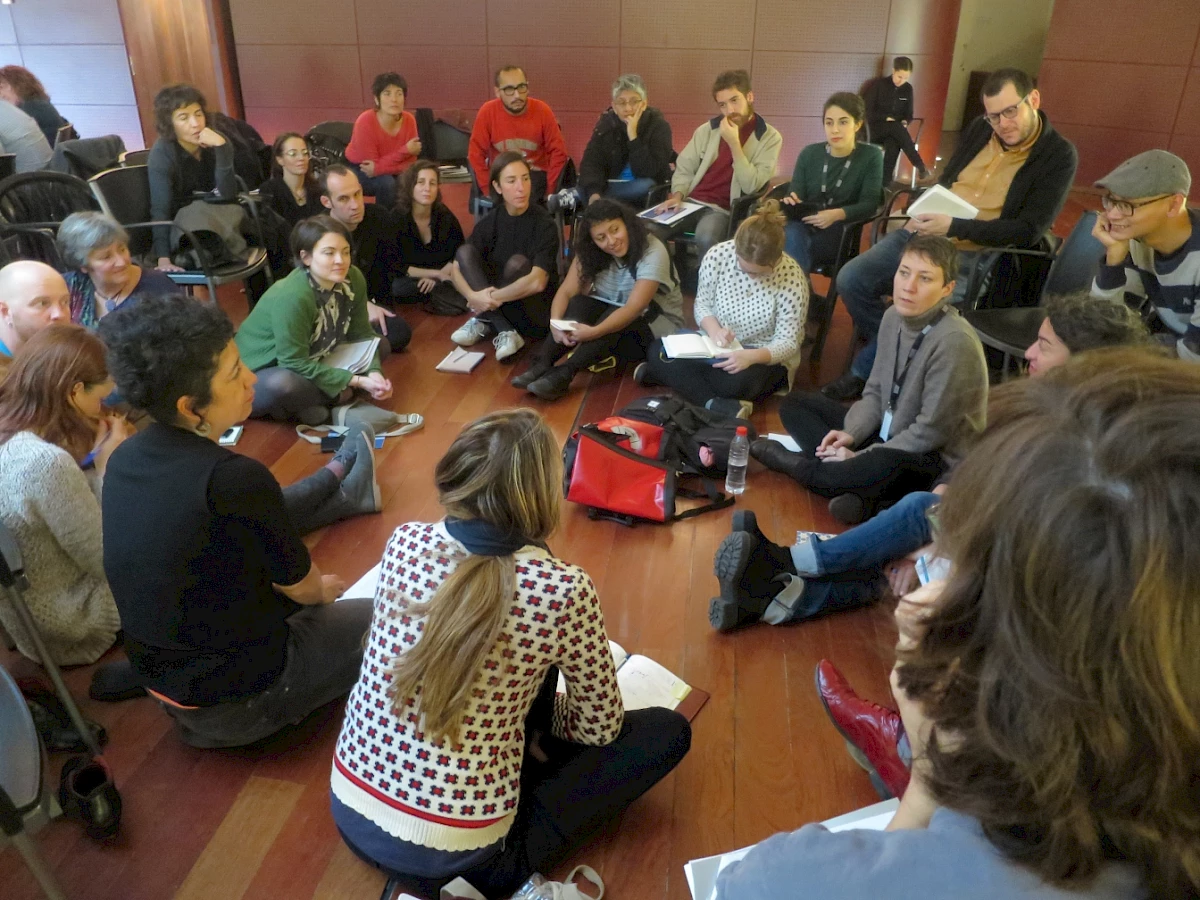
Workshop: 'Archive Economies', Museo Reina Sofía, 12 December 2015. Photo: Red Conceptualismos del Sur.
ARCHIVE ECONOMIES
In Europe, the state has traditionally been the guarantor of the material and economic continuity of the archive, so much so that this permanence is one of its defining characteristics. Outside Europe, other geopolitical instances have had to deal with historical structures in which the state abandons or blocks the development of archival policies for different reasons. At the same time, against a backdrop of global neoliberal policies, archives have become an object of desire for the market for some years now, partly due to their status as potential producers of knowledge. As such, we are seeing a significant process of privatisation of archives that may even end up influencing scientific and social agendas.
One of the main characteristics of a political economy of the "commons" is the attempt to move beyond the distinction between the state and the market, a distinction that is a constituent element of our legal and economic systems, as argued by Pierre Dardot and Christian Laval (2014). The values of mutualisation, reciprocity, and collective action, which are the bedrock of any concept of the commons, are framed within a reconfiguration of established economic theories, and seek to institute other models.
An archive of the commons would thus be based on giving up both the guarantee of the state and the logic of the market. As such, one of the challenges facing these models is to find forms of continuity and dissemination, in a context of institutional instability, economic precariousness, and discontinuity of the specific agents on which they are based.
One of the key issues obviously has to do with exploring the sustainability strategies that can be implemented by archives of the commons, while recognising that archives of the commons produce an economy at every stage of their existence, from their conditions of emergence to their modes of organisation, management and proliferation. In this sense, an archive of the commons produces an ecosystem that simultaneously allows it to exist and to open up to other actors, agents, and/or institutions. So instead of questioning archive economies, we should perhaps think about what economic-political ecosystems archives of the commons establish.

Screenshot from El-Recetario.net. Courtesy of Makea Tu Vida.
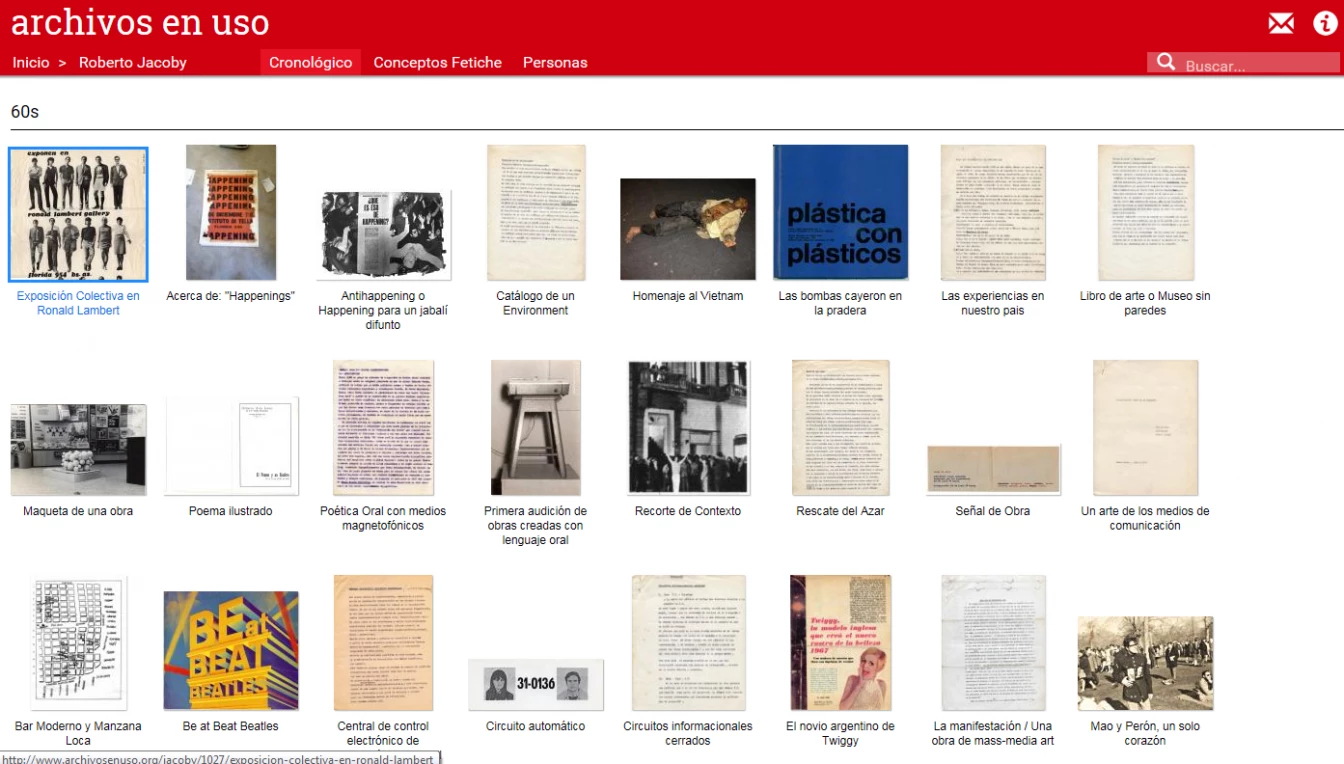
Archivos en uso (Archives in use) is a collective project initiated by various working groups of the Red Conceptualismos del Sur and of the “Grupo de Estudios sobre Arte, cultura y política en la Argentina reciente” (Recent Argentinian Art, Culture and Politics Study Group), based in the Gino Germani Research Institute, Social Sciences Faculty, University of Buenos Aires.
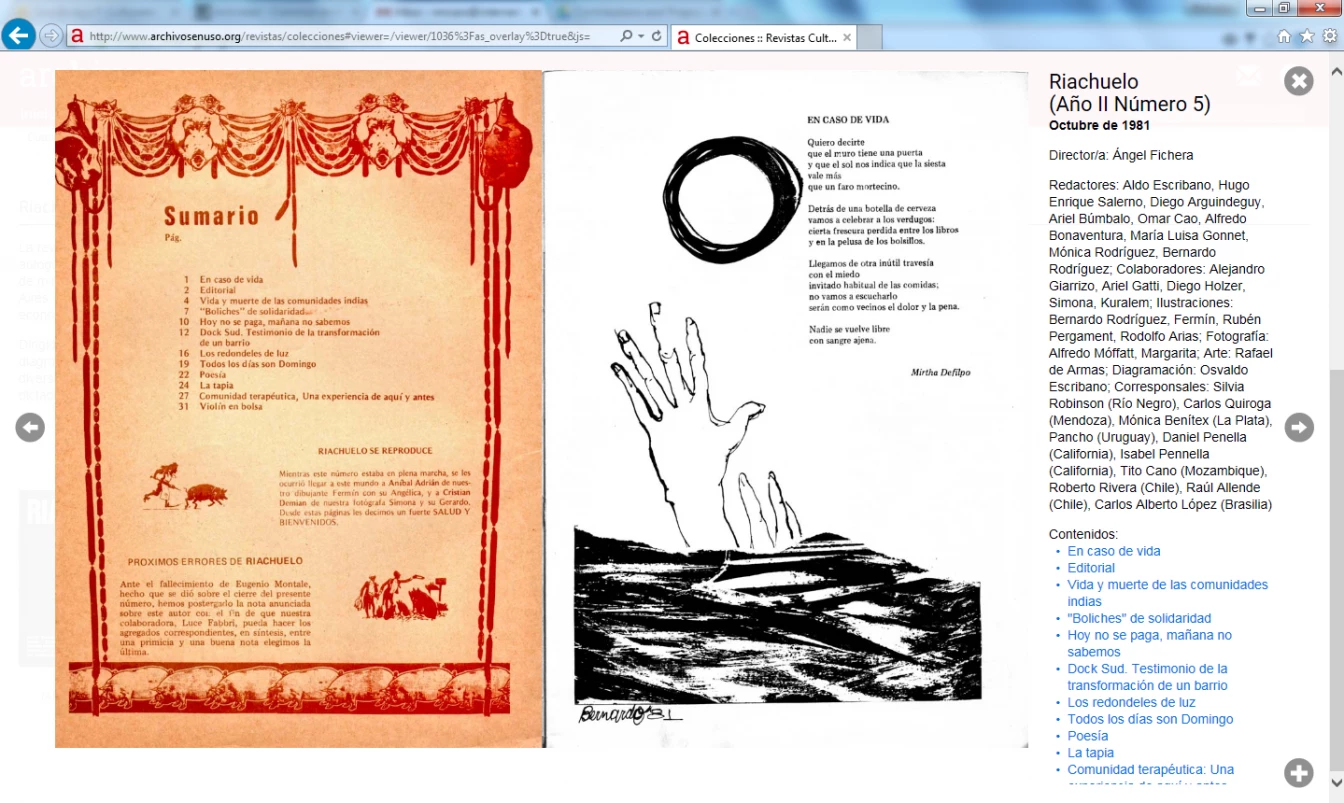
Archivos en uso (Archives in use) is a collective project initiated by various working groups of the Red Conceptualismos del Sur and of the “Grupo de Estudios sobre Arte, cultura y política en la Argentina reciente” (Recent Argentinian Art, Culture and Politics Study Group), based in the Gino Germani Research Institute, Social Sciences Faculty, University of Buenos Aires.
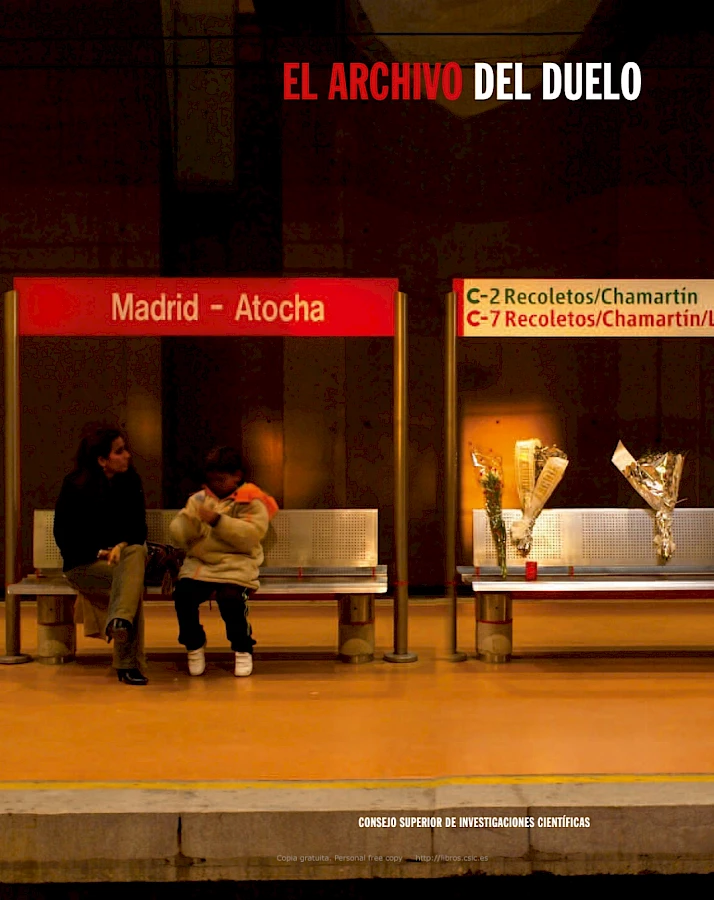
Archivo del Duelo (Archive of Mourning). Courtesy of Archivo Histórico Ferroviario and CSIC.
TECHNO-POLITICAL DEVICES
The technological form of an archive is inseparable from its political dimension. With the introduction of the Internet, the archive has become one of the key battlegrounds of contemporary societies. The creation of technological devices that allow openness, as well as hybrid, mutable taxonomies, collective production, and universal accessibility, is the condition of possibility for archives of the commons. Key questions in regard to an archive of the commons include: When was it created, in what context, and for what purpose? (Conditions of emergence). Who owns it? Who does it represent? Who does it target or address? Who determines its uses? (Ownership of the archive). What does it contain? What are the criteria for inclusion in the archive? How is the archive organised? What about the production of metadata? And interoperability markers? (Structure and classification criteria). How is it presented, disseminated, and activated? (Modes of activation: curatorial, research-related, and political. Modes of dissemination, interconnection, and access). How is it managed and how is its sustainability ensured? (Sustainable management models and strategies). What conceptual, archival, and technological devices are or should be used?
The structural, multifaceted debate that took place at the seminar sought to reconcile different registers of experience and thought by combining the local and international spheres, and the individual and collective domains. The rich debate and the fertile exchange of ideas showed that there is a strong need to open up spaces of this nature. The event became what we could call ground zero for a shared reflection that we hope will continue on a long-term basis, as a means of exploring new prospects for building architectures that will contribute to the reformulation the meaning of "the common".
References:
Dardot P. and Laval C. 2014, Commun. Essai sur la révolution au XXIe siècle (Common. An Essay on Revolution in the 21st Century), La Découverte, Paris.
Perec, G. 1974/ 1997, "Think/Classify", in J. Sturrock (ed.), Species of Spaces and Other Pieces, Penguin, London.
INFORMATION ON THE ARCHIVES
Archivo Contra la Pared (Archive Against the Wall)
A digital archive of graphic politics. The collection is made up of documents (posters, pamphlets, stickers, etc.) made by political and social collectives and initiatives from Seville, stretching from 1978 to the present day. The materials are from local movements, ecologists, anti-militarists, the libertarian movement, self-managed social centres, the student movement, feminisms, the labour and trade union movement, left-wing political parties, and citizen platforms, among others.
Archivo de Estudios Campesinos (Rural Studies Archive)
A project that organises and catalogues existing documents on trade union and political struggles in the rural world, and on social movements advocating food sovereignty, and agroecological research conducted from the second half of the twentieth century to the present day in the Andalusia region. The project was started and developed by the Juan Díaz del Moral Rural Studies Group.
Archivo de la autonomía juvenil de Madrid (Archive of Youth Autonomy in Madrid)
This archive encompasses a broad documentary collection of youth collectives from Madrid, produced for the most part in the period spanning 1986 and 2003. It comprises a compilation of original documents (posters, stickers, conference minutes, pamphlets), primarily collected from activists' personal archives. The project is carried out with the support of the research group Globalisation and Social Movements from the Nomad University.
Archivo del Duelo (Archive of Mourning)
A multidisciplinary research project that aims to preserve, catalogue and study the mourning that took place after the 11 March terrorist attacks in Madrid in 2004. This initiative is promoted by Spain's Scientific Research Council (CSIC) and looks to recover materials that were destined to become ephemeral, for instance photographs, drawings, texts and placards, as well as other materials left in improvised shrines, to establish an archive of collective memory. The archive is deposited in the Archivo Histórico Ferroviario (Historic Railway Archive).
Archivo Digital de la Autonomía Obrera (Digital Archive of Workers' Autonomy)
A project promoted by the Espai en Blanc Foundation that compiles experiences, publications and books on the assembly and anti-capitalist movements behind independence struggles during the Franco regime and the transition to democracy in Spain. The documents gathered in the digital archive largely hail from a clandestine archive compiled since 1965 in Barcelona by different activists from autonomy spheres.
Archivos en uso (Archives in Use)
A platform that assembles materials from research carried out on art and politics in Latin America, and developed by Red Conceptualismos del Sur (RedCSur), in dialogue with the custodians of the materials. The project aims to preserve and collectivise these materials, and the platform was initiated and is developed by RedCSur and promoted in collaboration with the Study Group on Art, Culture and Politics in Modern-day Argentina, from the Gino Germani Research Institute at the University of Buenos Aires.
Desmemoriados (Forgetfulness)
An open platform in which information, documents, research, images and any form of content that contributes to building the Collective Memory of Cantabria are gathered. Without attempting to organise academic transience – for instance, bounded by epochs or time periods – the project started by the La Vorágine collective stretches from the time preceding the proclamation of the Second Republic in Spain (1931) to the initial years in the period starting from the death of Franco and the transition to democracy at the end of the 1970s.
El Recetario (The Cookbook)
A research platform in the sphere of ecological design, the re-use of waste and open-source, committed to promoting DIY culture in our society. This initiative by Makea Tu Vida constitutes a repository with which to promote the development of open design tools and strategies in recycling and using waste, thereby promoting collaborative work as a decentralised method of learning and empowerment.
Feminicidio.Net
A website developed to give visibility to domestic violence in Spain and Latin America. The platform strives to create a social network by joining news, interviews, articles, special research and online training and promoting the search for appropriate legal regulations for feminicide. It has also developed an online database, where all the information that is available can be consulted and is organised into different categories of abuse suffered by women.
Human Costs of Border Control
A database which organises information from official sources on people who died while attempting to reach southern European Union countries from the Balkans, the Middle East and North and West Africa. The project, started by a team of researchers from VU University Amsterdam, aims to develop this tool in order to promote greater research, new analyses and specific changes related to migration policies.
PAD.MA
An archive of video material, primarily footage and unfinished films. The entire collection can be downloaded, viewed, annotated and edited online as it puts forward different types of viewing and contextualisation as well as categorisations and descriptors. The project initiated by the platforms camp (Mumbai), 0x2620 (Berlin) and Alternative Law Forumindian (Bangalore) aims to free sequences (videos and images), as much as spectators, from the conventions of editing.
Women in Black
A feminist non-violent organisation against militarism, created in Serbia in 1991, which has built a worldwide solidarity network. Symbolically dressed in black, the organisers carry out interventions in public spaces in order to prevent and resolve conflicts through dialogue and to encourage women's active participation. The organisation produces a textual and visual archive of struggles, protests, actions, reminders and legal procedures.
Translated by Nuria Rodríguez